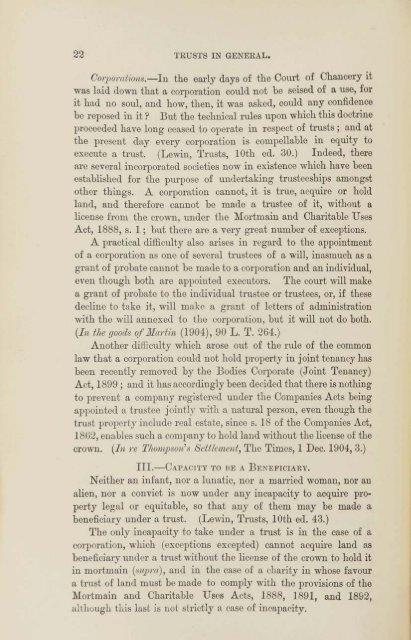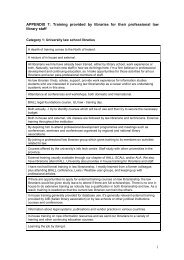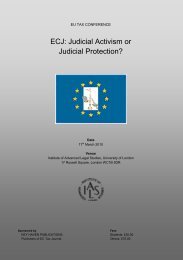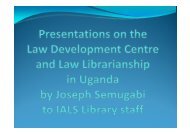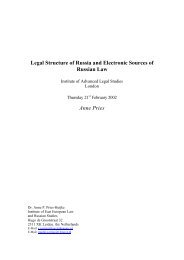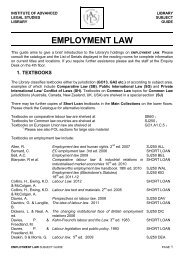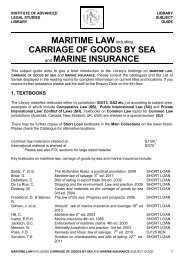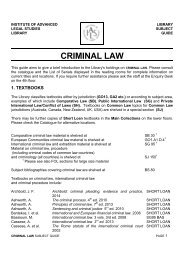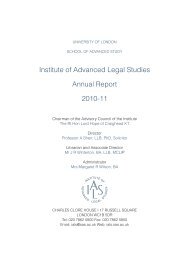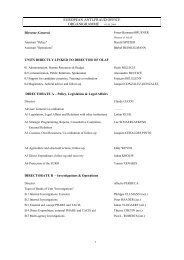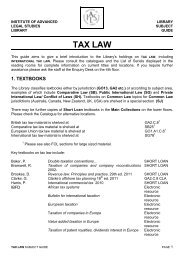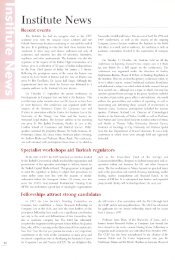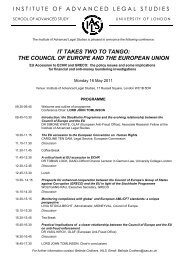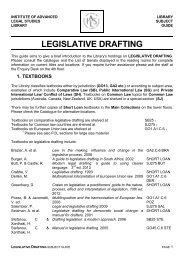a thesis - Institute of Advanced Legal Studies
a thesis - Institute of Advanced Legal Studies
a thesis - Institute of Advanced Legal Studies
Create successful ePaper yourself
Turn your PDF publications into a flip-book with our unique Google optimized e-Paper software.
22 TRUSTS IN GENERAL.<br />
Corporations.—In the early days <strong>of</strong> the Court <strong>of</strong> Chancery it<br />
was laid down that a corporation could not be seised <strong>of</strong> a use, for<br />
it had no soul, and how, then, it was asked, could any confidence<br />
be reposed in it ? But the technical rules upon which this doctrine<br />
proceeded have long ceased to operate in respect <strong>of</strong> trusts ; and at<br />
the present day every corporation is compellable in equity to<br />
execute a trust. (Lewin, Trusts, 10th ed. 30.) Indeed, there<br />
are several incorporated societies now in existence which have been<br />
established for the purpose <strong>of</strong> undertaking trusteeships amongst<br />
other things. A corporation cannot, it is true, acquire or hold<br />
land, and therefore cannot be made a trustee <strong>of</strong> it, without a<br />
license from the crown, under the Mortmain and Charitable Uses<br />
Act, 1888, s. 1; but there are a very great number <strong>of</strong> exceptions.<br />
A practical difficulty also arises in regard to the appointment<br />
<strong>of</strong> a corporation as one <strong>of</strong> several trustees <strong>of</strong> a will, inasmuch as a<br />
grant <strong>of</strong> probate cannot be made to a corporation and an individual,<br />
even though both are appointed executors. The court will make<br />
a grant <strong>of</strong> probate to the individual trustee or trustees, or, if these<br />
decline to take it, will make a grant <strong>of</strong> letters <strong>of</strong> administration<br />
with the will annexed to the corporation, but it will not do both.<br />
(In the goods <strong>of</strong> Martin (1904), 90 L. T. 264.)<br />
Another difficulty which arose out <strong>of</strong> the rule <strong>of</strong> the common<br />
law that a corporation could not hold property in joint tenancy has<br />
been recently removed by the Bodies Corporate (Joint Tenancy)<br />
Act, 1899 ; and it has accordingly been decided that there is nothing<br />
to prevent a company registered under the Companies Acts being<br />
appointed a trustee jointly with a natural person, even though the<br />
trust property include real estate, since s. 18 <strong>of</strong> the Companies Act,<br />
1862, enables such a company to hold land without the license <strong>of</strong> the<br />
crown. (In re Thompson's Settlement, The Times, 1 Dec. 1904, 3.)<br />
III.—CAPACITY TO BE A BENEFICIARY.<br />
Neither an infant, nor a lunatic, nor a married woman, nor an<br />
alien, nor a convict is now under any incapacity to acquire property<br />
legal or equitable, so that any <strong>of</strong> them may be made a<br />
beneficiary under a trust. (Lewin, Trusts, 10th ed. 43.)<br />
The only incapacity to take under a trust is in the case <strong>of</strong> a<br />
corporation, which (exceptions excepted) cannot acquire land as<br />
beneficiary under a trust without the license <strong>of</strong> the crown to hold it<br />
in mortmain (supra}, and in the case <strong>of</strong> a charity in whose favour<br />
a trust <strong>of</strong> land must be made to comply with the provisions <strong>of</strong> the<br />
Mortmain and Charitable Uses Acts, 1888, 1891, and 1892,<br />
although this last is not strictly a case <strong>of</strong> incapacity.


